| Listing 1 - 10 of 12 | << page >> |
Sort by
|
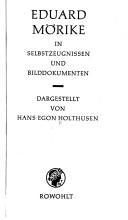
ISBN: 3499501759 Year: 1971 Publisher: Reinbek Rowohlt
Abstract | Keywords | Export | Availability | Bookmark
 Loading...
Loading...Choose an application
- Reference Manager
- EndNote
- RefWorks (Direct export to RefWorks)
Mörike, Eduard --- Mörike, Eduard, --- Mërike, Ė., --- Molike, Aidehua, --- Möricke, Eduard, --- Mörike, Eduard,
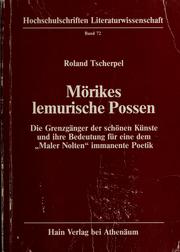
ISBN: 3445024464 Year: 1985 Publisher: Königstein Hain
Abstract | Keywords | Export | Availability | Bookmark
 Loading...
Loading...Choose an application
- Reference Manager
- EndNote
- RefWorks (Direct export to RefWorks)
Artists in literature --- Mörike, Eduard, --- Mërike, Ė., --- Molike, Aidehua, --- Möricke, Eduard, --- Characters --- Artists. --- Mörike, Eduard
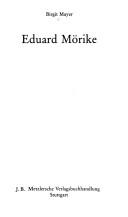
ISBN: 3476102378 Year: 1987 Volume: vol 237 Publisher: Stuttgart
Abstract | Keywords | Export | Availability | Bookmark
 Loading...
Loading...Choose an application
- Reference Manager
- EndNote
- RefWorks (Direct export to RefWorks)
Mörike, Eduard --- Morike, Eduard Friedrich --- Authors, German --- Mörike, Eduard, --- Mërike, Ė., --- Molike, Aidehua, --- Möricke, Eduard, --- Mörike (Eduard). --- Mörike, Eduard,
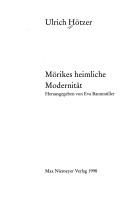
ISBN: 3484107723 3110931966 Year: 1998 Publisher: Tübingen : Max Niemeyer,
Abstract | Keywords | Export | Availability | Bookmark
 Loading...
Loading...Choose an application
- Reference Manager
- EndNote
- RefWorks (Direct export to RefWorks)
Eduard Mörike (1804-1875) gilt in der Literaturwissenschaft als ungewöhnlich schwer zugänglicher Dichter. Nach jahrzehntelanger Arbeit an der Historisch-Kritischen Gesamtausgabe wollte Ulrich Hötzer die Ergebnisse seines dialogischen Umgangs mit Mörike veröffentlichen. Dieser Band, posthum herausgegeben, folgt dem Editionsplan des Verfassers: Mörikes Formkunst - Einzelinterpretationen - Mörikes Hellenismus. Den drei großen Kapiteln sind Aufsätze, unveröffentlichte Vorträge, Interpretationen und Aufzeichnungen zugeordnet. In dem weiten Spannungsbogen von antiker bis zu moderner Dichtung wird der Versuch unternommen, Mörike als Nachfahre des Horaz und Gefährte von Baudelaire zu fassen - beide Pole gleichsam unerforscht in der Mörike-Forschung. Mörikes Rückbindung an die Tradition der antiken Dichtung äußert sich im Anknüpfen an bestimmte antike Autoren in Motiv, Struktur, Gattung (Epigramm, Epistel, Satire) und Form (Distichon, Senar, paraphrasierte Hexameter, Sapphische Ode). Somit steht Mörike in einer von Wieland in die deutsche Literatur eingeführten Tradition, die in Mörikes Formkunst ihren Höhepunkt erreicht. Die hohe Formkunst des poeta doctus herauszustellen, die von Wieland eingeklagte 'Leichtigkeit' in der Aneignung und Handhabung der griechisch-abendländischen Vers- und Strophenformen, war das Anliegen Hötzers. An den feinsinnigen Einzelinterpretationen wird dies deutlich, dann besonders im dritten Kapitel "Mörikes Hellenismus". Die genaue Textanalyse macht das Verfahren der imitatio als einer Maske deutlich, in deren Fremdheit sich das Eigene und Eigentliche der Welterfahrung des Dichters spiegelt. Sie zeigt aber auch die zentrale Bedeutung, die der Erinnerung als Grundelement im dichterischen Prozeß zukommt, zeigt die Antizipation moderner Welterfahrung, die das Mörikesche Werk der literarischen Moderne annähert.
Mörike, Eduard, Friedrich --- Languages & Literatures --- Germanic Literature --- Mörike, Eduard --- Mörike, Eduard, --- Criticism and interpretation. --- Mërike, Ė., --- Molike, Aidehua, --- Möricke, Eduard,
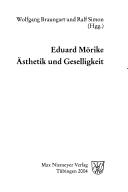
ISBN: 3484108649 3110929694 Year: 2004 Publisher: Tübingen Niemeyer
Abstract | Keywords | Export | Availability | Bookmark
 Loading...
Loading...Choose an application
- Reference Manager
- EndNote
- RefWorks (Direct export to RefWorks)
Even today, Mörike (1804-1875) is still not accorded the attention he deserves, not least because of the difficulty of relating him to the major tendencies of the 19th century. He is not an intellectual like Heine. He did not intervene in the major political debates of his time. We find little trace in his works of economic or social upheavals. He did not rebel against the dominance of the great German classics. He has nothing of the iconoclast about him. In his works apparently insignificant things attain significance. They are incorporated into the process of aesthetic reflection and set off against concrete features of his life-world. Accordingly, 'aesthetics' and 'sociability' are mutually productive, the one being a reflection of the other. Nach wie vor findet Mörike (1804-1875) nicht die Aufmerksamkeit, die ihm eigentlich zukäme - wohl auch, weil er sich nicht leicht den großen Tendenzen des 19. Jahrhunderts zuordnen läßt: Er ist kein Intellektueller wie Heine. Er mischt sich nicht in die großen politischen Debatten ein. Er thematisiert nicht die wirtschaftlichen und sozialen Umwälzungen. Er begehrt nicht gegen die Dominanz der deutschen Klassik auf; er ist kein Denkmalstürzer. Das Nebensächliche bekommt bei ihm besondere Bedeutung; es wird in einen ästhetischen Reflexionsprozeß hineingezogen, der mit lebensweltlichen Konkretisierungen einhergeht, so daß sich "Ästhetik" und "Geselligkeit" gegenseitig hervorbringen und spiegeln.
Mörike, Eduard --- Morike, Eduard Friedrich --- Mörike, Eduard, --- Mërike, Ė., --- Molike, Aidehua, --- Möricke, Eduard, --- Aesthetics --- Criticism and interpretation --- Kongress. --- Mörike, Eduard. --- Rheinfelden ‹Aargau, 2003›. --- LITERARY CRITICISM / European / German.
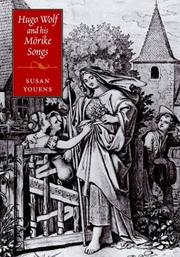
ISBN: 052165159X 0521027195 1107117127 0511173350 0511152418 0511327501 0511481977 1280420588 051104805X 9780511481970 0511019262 9780511019265 051103282X 9780511032820 9780511152412 9780521651592 9786610420582 6610420580 9780511048050 Year: 2000 Publisher: Cambridge New York Cambridge University Press
Abstract | Keywords | Export | Availability | Bookmark
 Loading...
Loading...Choose an application
- Reference Manager
- EndNote
- RefWorks (Direct export to RefWorks)
Viennese composer Hugo Wolf produced one of the most important song collections of the nineteenth century when he set to music fifty-three poems by the great German poet Eduard Mörike. Susan Youens reappraises this singular collaboration to shed new light on the sophisticated interplay between poetry and music in the songs. Wolf is customarily described as 'the Poet's Composer', someone who revered poetry and served it faithfully in his music. Yet, as Youens reveals, this cliché overlooks the rich terrain in which his songs are often at cross purposes with his chosen poetry. Although Wolf did much to draw the world's attention to the neglected Swabian poet, his musical interpretation of the poetry was also influenced by his own life, psychology and experiences. This book examines selected Mörike songs in detail, demonstrating that the poems and music each have their own distinctive stories which at times intersect but also diverge.
Mörike, Eduard Friedrich, --- Wolf, Hugo, --- Musical settings --- History and criticism. --- Mörike, Eduard, --- Mërike, Ė., --- Molike, Aidehua, --- Möricke, Eduard, --- Wolf, Hugo --- Mörike, Eduard, Friedrich --- History and criticism --- Duitsland --- 19e eeuw --- Liederen --- Morike, Eduard,
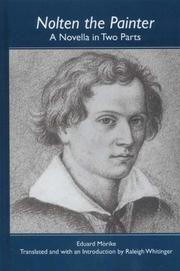
ISBN: 1281741361 9786611741365 1571136665 1571133127 Year: 2005 Publisher: Rochester, N.Y. : Camden House,
Abstract | Keywords | Export | Availability | Bookmark
 Loading...
Loading...Choose an application
- Reference Manager
- EndNote
- RefWorks (Direct export to RefWorks)
When one thinks of German artist-novels and 'Bildungsromane,' works long available in translation come to mind-by Goethe, Novalis, Hoffmann, Stifter, Keller, or more recently by Mann, Kafka, Musil, or Grass. Yet Eduard Mörike's provocatively subtitled 'Maler Nolten: Novelle in zwei Teilen' (Nolten the Painter: A Novella in Two Parts, 1832) has remained neglected and misunderstood, and until now has never been translated into English, despite its obvious ties to other artist-novels and its striking modernity in playing with conventions of narrative authority and heroic identity. Witness the subtle irony of the opening sequence, in which the narrator is subverted by hints at his own clumsiness and intimations about the dire truths that lurk behind the protagonist Nolten's relationships to his male friends and to the seductive yet somehow frightening women in his life. Or the interplay between the narrator's attempts to make sense of Nolten's complex inner motivations in his loves and art and the ludicrously pompous pathos with which Nolten persists in speaking and thinking, as he concocts a heroic persona caught up in passion, intrigue, and tragedy. Fascinating too is the mysterious trail of the 'Grenzgänger,' or border-line characters, with their hints at the dimension of 'Gypsies, Tramps, and Thieves' that seems to threaten and at the same time to foster the complex unfolding of the realities of life and art that defy Nolten's all-too-artful 'mastery.' Raleigh Whitinger is professor in the Department of Germanic Languages at the University of Alberta.
Bildungsromans, German. --- German Bildungsromans --- German fiction --- Mörike, Eduard, --- Mërike, Ė., --- Molike, Aidehua, --- Möricke, Eduard, --- LITERARY CRITICISM / General. --- Bildungsromane. --- Eduard Mörike. --- German Artist-Novel. --- Gypsies. --- Heroic Identity. --- Narrative Authority. --- Raleigh Whitinger. --- Thieves. --- Tramps. --- Morike, Eduard,

ISBN: 3503012540 Year: 1978 Publisher: Berlin
Abstract | Keywords | Export | Availability | Bookmark
 Loading...
Loading...Choose an application
- Reference Manager
- EndNote
- RefWorks (Direct export to RefWorks)
Mörike, Eduard --- Storm, Theodor --- Mörike, M. --- Morike, Eduard Friedrich --- -Storm, Theodor --- -Correspondence --- Correspondence --- Authors, German --- Correspondence. --- Storm, Theodor, --- Mörike, Eduard Friedrich, --- Mörike, Eduard, --- Shih-tu-mo, Tʻe-ao-to-erh, --- Storm, Hans Theodor Woldsen, --- Mërike, Ė., --- Molike, Aidehua, --- Möricke, Eduard,

ISBN: 3534067207 9783534067206 Year: 1975 Volume: 446 Publisher: Darmstadt Wissenschaftliche Buchgesellschaft
Abstract | Keywords | Export | Availability | Bookmark
 Loading...
Loading...Choose an application
- Reference Manager
- EndNote
- RefWorks (Direct export to RefWorks)
Mörike, Eduard --- Mörike, Eduard, --- Criticism and interpretation --- Morike, Eduard Friedrich --- -Criticism and interpretation --- -Addresses, essays, lectures --- Mörike, Eduard Friedrich, --- Criticism and interpretation. --- Mërike, Ė., --- Molike, Aidehua, --- Möricke, Eduard, --- Mörike (Eduard). (Mélanges) --- Mörike (Eduard). (Versch. onderwerpen) --- Mörike, Eduard, - 1804-1875 --- Mörike, Eduard,
Book
ISBN: 3476018121 9783476018120 Year: 2004 Publisher: Stuttgart Metzler
Abstract | Keywords | Export | Availability | Bookmark
 Loading...
Loading...Choose an application
- Reference Manager
- EndNote
- RefWorks (Direct export to RefWorks)
Mörike, Eduard --- Authors, German --- Mörike, Eduard, --- Criticism and interpretation --- Mörike, Eduard Friedrich, --- Criticism and interpretation. --- Mërike, Ė., --- Molike, Aidehua, --- Möricke, Eduard, --- Authors, German - 19th century - Biography --- Mörike, Eduard, - 1804-1875 --- Mörike, Eduard, - 1804-1875 - Criticism and interpretation
| Listing 1 - 10 of 12 | << page >> |
Sort by
|

 Search
Search Feedback
Feedback About UniCat
About UniCat  Help
Help News
News